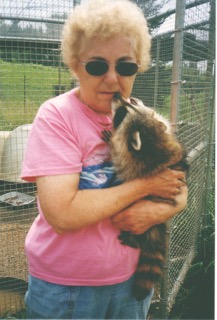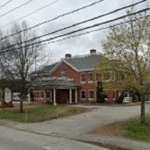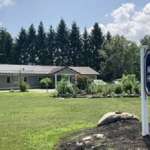Co-founder of wildlife rehab center remembered

Carleen Cote with one of her “babies.”
A tribute to a special “mother”
by Lea Davis
One definition of “mother” is “nurturer.” A good mother puts her children’s needs before her own to insure their health and welfare.
Carleen Cote, of Vassalboro, alongside her husband Donald, has, for 53-plus years, rescued thousands of Maine’s abandoned and starving wild animal babies, nurturing them back to health and eventual freedom, all at the couple’s own expense. She wrote a popular monthly column about her “children” for The Town Line and Turner Publishing newspapers, always crediting the help received from faithful volunteers, local veterinarians, the Department of Inland Fisheries and Wildlife wardens and staff, other rehabbers and the caring people who donated money, food and supplies for the wildlife. Carleen Cote passed away on April 27. Her story is best told through her own words gleaned from 240+ “Critter Chatter” articles, which she wrote over 20 years’ time. Here are a few excerpts:
“The month of April arrives and so do the babies. The raccoons appeared in droves. Containers for them started to fill the living room, formulas were made, the babies would be fed four times a day, the last feeding at midnight. Hundreds of used towels needed to be washed, dried and folded for the next change (after every feeding!). One night in May, Donald decided to count the raccoons as we had lost track – he counted 150! In addition, skunks, mink, weasels, opossums, fawns, foxes, porcupines and woodchucks were arriving. We were overwhelmed and exhausted. However, our dedicated volunteers saved us. God bless them!
“Though raccoons are in the majority, they don’t usually present the challenges that we face with the fawns. One year we received 20 fawns, requiring several trips to the veterinarian with broken bones, open sores and coccidiosis infections. Seven fawns died from their wounds, received either by vehicle hits or predator attacks. Some won’t nurse from the bottle, making it necessary to use a syringe to administer the milk. We carry on.
“Over the spring and summers months the animals, eventually moved to outside pens, grew and got fat. Many were released in late August to their natural habitats. September is the release time for the raccoons. Could we find enough spots to release 150 of them? We did it, at last! The raccoons react differently when taken to the chosen release sites. Some left the carrier, happy to roam, others hesitated, terror showing in their eyes, but, eventually, decided to explore their new surroundings. We are asked, “Are you sad to see them go after spending so much time caring for them?” Yes and no – we do wonder how they are faring, but know they are where they belong, enjoying the things they naturally do in the wild.
“We are frequently asked how we got involved in wildlife rehabilitation. It began when Donald expressed the desire to raise waterfowl. We were fortunate to find land in Vassalboro with a small area of water that could be enlarged. Then, an article about a wildlife rehab facility in Litchfield caught our attention. Would we be interested in doing this also? You guessed it! Our first critter to arrive, even before we had any permits, was a baby black duck. We applied for our state and federal permits and became licensed rehabbers. The rest is history. We gradually expanded our efforts and facilities way beyond the needs of one baby black duck in 1964, to now caring for hundreds of wildlife a year.”
Carleen was fond of a writing she’d come across entitled “I Am An Animal Rescuer,” author unknown. In part, it reads:
“My job is to assist God’s creatures, I was born with the drive to fulfill their needs
I take in helpless, unwanted, homeless creatures without planning or selection
I have bought cat food with my last dime. I have patted a mangy head with a bare hand
I have hugged someone vicious and afraid. I have fallen in love a thousand times
And I have cried into the fur of a lifeless body too many times to count
I am an Animal Rescuer. My work is never done. My home is never quiet.
My wallet is always empty, but my heart is always full.”
Goodbye old friend.
Memorial donations may be made to Kennebec Valley Humane Society, 10 Pet Haven Lane, Augusta, ME 04330.
Responsible journalism is hard work!
It is also expensive!
If you enjoy reading The Town Line and the good news we bring you each week, would you consider a donation to help us continue the work we’re doing?
The Town Line is a 501(c)(3) nonprofit private foundation, and all donations are tax deductible under the Internal Revenue Service code.
To help, please visit our online donation page or mail a check payable to The Town Line, PO Box 89, South China, ME 04358. Your contribution is appreciated!





Leave a Reply
Want to join the discussion?Feel free to contribute!